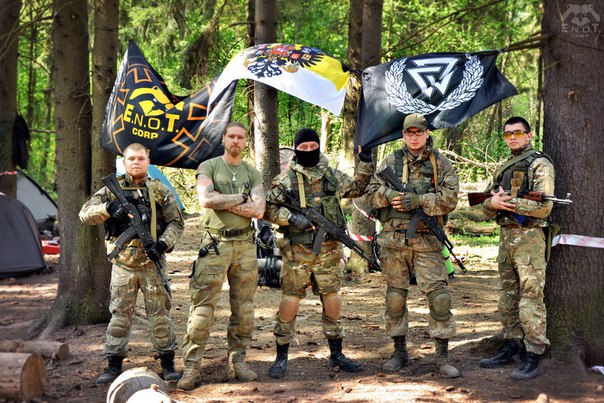
Russian Nationalist Group, Acting as a Private Military Company, Worries Kremlin
Publication: Eurasia Daily Monitor Volume: 15 Issue: 164
By:

Private military companies (PMC), which the Kremlin has used with success in Ukraine, Syria, the Central African Republic and elsewhere, nonetheless constitute a potentially serious problem domestically for Russia. If they pursue their own goals, they can challenge the government’s monopoly on the legitimate use of force and even threaten its control of key sectors. That is one of the reasons why the Russian Federation has not legalized them. But their rise, especially in the gray area of semi-legality, is now frightening the powers that be in the Kremlin who have turned to the Federal Security Service (FSB) in an effort to establish tighter control over one of these groups.
In the last few weeks, the FSB, working together with the police, arrested several members of the E.N.O.T. Corp., a Russian nationalist organization that, over the last year, has succeeded in “transforming itself into a private military company. This is according to an investigation carried out by three journalists at the Russian website Daily Storm (Daily Storm, November 9). That this transformation occurred is no surprise given the Russian government’s willingness to make use of E.N.O.T.-trained cadre in Donbas and Syria. And the fact that the authorities are now afraid of the hybrid organization they have created is also hardly a shock. Naturally, therefore, the FSB made sure to conduct this operation as quietly as possible, given what some would make of it were it better known.
On November 7, media in Ryazan (Rzyazan Oblast, 120 miles southeast of Moscow) reported that several people had been detained but did not give any details as to who they were or what specifically they were arrested for (Ya62.ru, November 7). The next day, the VKontakte social network page of the E.N.O.T. organization reported that those arrested were part of its private military company. The following day, it added that all those detained had been released and that the organization would seek to defend their honor in court (Vk.com, Noember 8).
According to the Daily Storm investigative journalists, the Ryazan arrests were part of “a large operation across the territory of the Russian Federation to clamp down on the activity of E.N.O.T.” The portal’s sources say that the FSB had decided to move after reports came in that E.N.O.T. was expanding its activities from training people who might be sent to hotspots abroad to providing young Russians with instruction of a kind inconsistent with such assignments. Indeed, the source implied, the authorities apparently are afraid that this group or one like it might be used against the existing political order in Russia.
E.N.O.T. Corp. was originally created by Igor Mangushev of the Russian nationalist movement Svetlaya Rus who was seeking a way for Russians of his habit of mind to participate in the Donbas conflict. He and his comrades set up camps in Russia and dispatched graduates to the Moscow-backed, separatist Luhansk and Donetsk “People’s Republics” nominally to provide humanitarian assistance but in fact to serve as fellow combatants against Ukrainian forces (Kommersant, March 23, 2015). Since that time, it has acted as a private military company in fact if not in name, receiving assistance from the Russian authorities and sending its people to Syria, Karabakh and elsewhere, as it proudly claims on its website. As the Daily Storm journalists recount, the group denies that it is a PMC. To say otherwise would put it beyond the law, which in Russia still declares the existence of any such group as prima facie evidence of criminal behavior (Daily Storm, November 9).
Nonetheless, E.N.O.T. has acted like one in various conflict areas and beyond. In Serbia, its actions were sufficiently aggressive that the authorities asked it to leave this past summer (see EDM, October 31). And in Belarus, its youth camps, which drew on military instructors from numerous places, looked like staging grounds for a possible coup attempt or at least as preparation for indirect support of a possible Russian military move—possibilities that clearly worried Minsk and the Belarusian opposition alike (see EDM, November 28, 2017). At the time, E.N.O.T. leaders provocatively said that “the Belarusian authorities had insufficiently opposed radical pro-Western forces, which ever more actively are preparing a repetition of the Ukrainian Maidan” there (Charter 97, September 25, 2017).
Up to the present, the Daily Storm journalists report, E.N.O.T. calls itself “a Russian Orthodox community” and points to its official registration with the Russian Ministry of Justice in May 2016 as giving it legal status. But since then, the group, whose acronym stands for “United Popular Communal Groups,” has not behaved like a regular non-governmental organization. Not once over that period has it filed the required declarations with the government.
Apparently, even though the Kremlin has been happy enough to use the E.N.O.T. Corp. to support its “hybrid” military operations outside of Russia, the senior leadership of the Russian Federation is increasingly concerned that this group, which acts like a PMC even if it refuses to call itself that, is a potential threat domestically. This seems all the more likely given that it is operating under the radar and because its chief ideologists are almost as radical in their criticism of Russian government policy as they are of the policies of the West. And it is clearly that ideological position, rather than the services it has provided Moscow with in the past, that is behind the new crackdown against E.N.O.T.
In short, Moscow intends to continue to make use of such companies; but its new moves against E.N.O.T. Corp. show that the Kremlin will insist that they follow the official line more closely and that they submit to greater control by the state than they have up to now.



